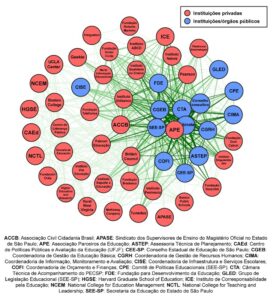Fernando Cássio, Assistant Professor in the Center for Natural and Human Sciences at the Federal University of ABC, Santo André, SP, Brazil.

Image: Fernando Cássio.
Beyond the transfer of assets and responsibilities from the public to the private sector, the privatization of education can be seen, in a broader sense, as a continuous process of reorganization and reformulation of the State itself. As a diffuse phenomenon, the progressively blurring boundaries between public and private challenges the methods enshrined in research on privatization of education, stimulating the production of analyses less focused on “government” than on “governance”.
The article “Heterarchization of the State and the expanding boundaries of education privatization in São Paulo”, published in Educação & Sociedade (vol. 41), deals with these analytical challenges and investigates the densification of public-private networks in the largest public-school system in Brazil between 2015 and 2018. The study by Cássio, Avelar, Travitzki and Novaes takes the public-private partnership between the Secretariat of Education of the Brazilian State of São Paulo and the non-profit organization Partners of Education Association (Associação Parceiros da Educação) around the Program Education – São Paulo’s Commitment (Educação – Compromisso de São Paulo) as a model to analyze State heterarchization processes.
The authors developed an algorithm that identifies co-occurrences of words in extensive physical digitalized documents and infers networks of relationships between actors, organizations and public policies. Based on the administrative process for monitoring the Program – which includes a large volume of drafts, contracts and amendments, technical reports, work plans, accountability reports, memoranda, and program modeling –, Cássio et al. (2020) analyzed the privatization of education in its procedural dimension, produced simultaneously with/by individuals and institutions, with/by governmental and non-governmental agents.
The study described three dynamics of complexification of the privatization of education in São Paulo: 1) the formal incorporation of a private organization in the governance structure of public education; 2) the porosity between education policies and the mobility of the private organization beyond the initial scope of the contracted partnership; and 3) the role of the private organization in expanding the governance network, acting as a boundary spanner and facilitating the entry of other private organizations via secondary and tertiary partnerships. These dynamics point to a deepening of the processes of neoliberalization and heterarchization of the State, which dilute roles and functions of governments and forge horizontal and vertical bonds that lead public institutions, private organizations and individuals to compete in decision-making and, also, in planning and executing education policies in the largest Brazilian public-school system.
The article results from the research “Education Policy in the São Paulo State Public-School System (1995 to 2018)”, supported by the São Paulo Research Foundation (Fapesp), and also derives from other recent productions from Public-School and University Network (REPU).
To read the articles, acess
CASSIO, F. et al. Heterarquização do Estado e a expansão das fronteiras da privatização da educação em São Paulo. Educ. Soc. [online]. 2020, vol. 41, e241711. ISSN: 1678-4626 [viewed 04 December 2020]. https://doi.org/10.1590/es.241711. Available from: www.scielo.br/scielo.php?script=sci_arttext&pid=S0101-73302020000100953&lng=en&nrm=iso
External links
Educação & Sociedade – ES: www.scielo.br/es
About the author
 Fernando Cássio received his PhD in Sciences (Chemistry) from the University of São Paulo and is currently an Assistant Professor at the Federal University of ABC, where he is part of the research group “Right to Education, Education Policy and School” (DiEPEE-UFABC). He also participates of the Public-School and University Network (REPU) and of the Brazilian Campaign for the Right to Education. E-mail: fernando.cassio@ufabc.edu.br (http://buscatextual.cnpq.br/buscatextual/visualizacv.do?id=K4736242Z5)
Fernando Cássio received his PhD in Sciences (Chemistry) from the University of São Paulo and is currently an Assistant Professor at the Federal University of ABC, where he is part of the research group “Right to Education, Education Policy and School” (DiEPEE-UFABC). He also participates of the Public-School and University Network (REPU) and of the Brazilian Campaign for the Right to Education. E-mail: fernando.cassio@ufabc.edu.br (http://buscatextual.cnpq.br/buscatextual/visualizacv.do?id=K4736242Z5)
Como citar este post [ISO 690/2010]:

















Recent Comments